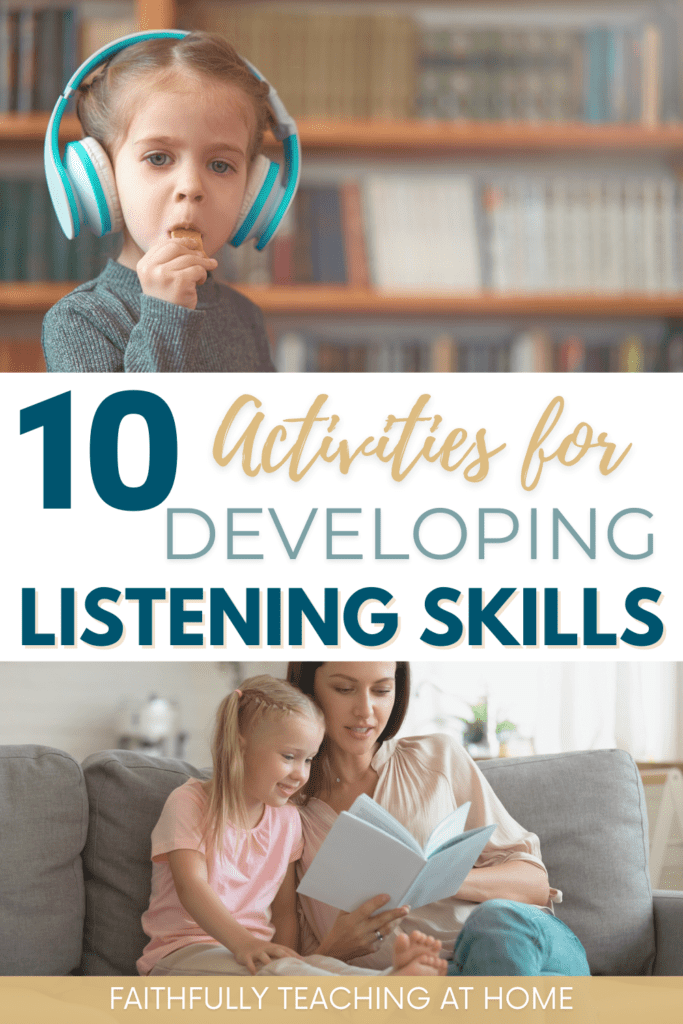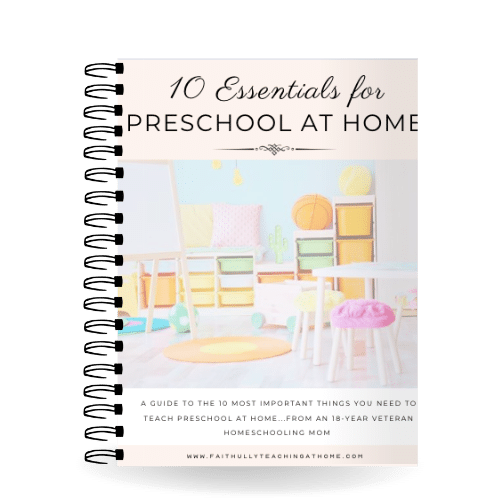How to Develop Listening Skills for Preschoolers

How to Develop Listening Skills for Preschoolers
Before we talk about activities for developing listening skills for preschoolers, let’s talk about why kids need to learn good listening skills. Most of us just assume that our children will just “know” how to listen. And some kids do. But some of us have kids that need to learn the correct way to listen and develop good listening habits.
Also, don’t confuse listening with obedience. Just because a child is a good listener does not mean he or she is good at being obedient. Obedience is a totally different lesson to teach!
Why are good listening skills important?
First of all, while ear health and being able to hear well are important, this is not what we are talking about when talking about listening skill for preschoolers. If you suspect that your child is not a good listener because of hearing issues, then please get him evaluated by his pediatrician first.
Have you ever asked your preschooler, “Are you even listening to me?”? I have one child that heard that from me a lot.
Here are some important reasons that why we need to be teaching our children to listen well.

10 Reasons Listening Skills for Preschoolers are Important
- Following Directions – Children can’t follow directions if they haven’t listened and processed what the directions even are.
- Safety – If not listening, children will miss important safety instructions and rules.
- Socializing – Think of the friends that you have. Would you still be friends with them if they never listened to you? What if they interrupted you constantly? What if you told them some important news but next time you saw them, they acted like they had never heard of that news? We need to teach our children to be good listeners to be good friends.
- Manners – Basically, it’s just good manners to be a good listener.
- Language Skills – Being a good listener helps you to be a good writer and speaker. Children also learn how to read by using good listening skills. Skilled writers are usually good listeners, too. They are observant and notice things that other people don’t.
- Communication – People tend to be good speakers and communicators when they have developed good listening skills.
- Education – Studies show that children who are active listeners are better prepared for class, feel more confident, and more comfortable in class.
- Vocabulary – Children will have a more extensive vocabulary when they are active listeners.
- Memory – If you listen well, you will be able to recall more things and remember things easier.
- Mental Growth – Between the ages of 2 and 4, children can’t communicate as well because the can’t speak well or write or read. But they can listen. Toddlers and preschoolers will listen carefully and voraciously take in knowledge. This helps them to interact with the adults around them and their environment.

Signs of a Poor Listener
We know now why good listening skills for preschoolers are important to have. But how do you know if your child is not a good listener?
Signs of poor listening skills are the following:
- Being distracted while listening
- Interrupting when others are talking
- Walking away in the middle of a conversation or instructions
- Not maintaining eye contact
- Frequently can’t follow directions given
- Being impatient to wait for other person to finish speaking so he can start talking
- Doesn’t answer when asked questions during conversations
- Immediately forgets the directions given to them
Something to remember that some of these signs are just kids being kids. They just need someone to teach them how to listen better and practice with them. It doesn’t necessarily mean that your child is intrinsically a poor listener.
So if you think your child is a poor listener, what can you do? Let’s talk about active listening.
What is active listening?
Active listening is when the listener is actively engaged with the speaker, and the engagement can be measured outwardly.
As parents, we need to model active listening to our children and give tips on how to be an active listener.
An active listener will:
- Maintain eye contact.
- Nod and smile and give physical signs that you are listening.
- Give the speaker their undivided attention.
- Ask questions.
- Rephrase the main point and say it back to the speaker.
- Don’t interrupt while the speaker is talking.
- Ask if you don’t understand something.
Let’s be intentional in modeling active listening to our children, especially in the younger years. Put posters around your house to remind everyone to be better listeners. Write reminders down in your planner to be an active listener that day. In your homeschool lesson planner, plan a quick 5-minute lesson and practice session on active listening. Plan activities to develop listening skills once a week. Gentle reminders go far in helping develop listening skills for preschoolers.

Activities for Developing Listening Skills for Preschoolers
- Play “Telephone” with your child and siblings. Stand in a line or circle. The first person whispers a phrase to the next person in line. Each person whispers what they think the person said to them to the next person. The last person says what he heard out loud. Usually it’s very different from the original phrase, and everyone will get a good laugh!
- Simon Says game – The perfect game to practice listening skills for preschoolers!
- Reading Aloud – Reading aloud to your child has so many benefits, and developing listening skills for preschoolers is a big one.
- Audio Books – For a change of pace from read alouds, audio books are a fun alternative .
- Narrations after short passages – After reading a picture book or a short passage, have your preschooler tell you what the book or passage was about in his own words. See how much detail he remembers.
- Nature Walk – Take your child on a nature walk. Be sure to take her sketch book and crayons or pencil. Find a spot and tell your child to close her eyes and just listen. After a short period of time, tell her to open her eyes and draw pictures of the sounds she heard.
- Nursery Rhymes or fairy tale – Read a nursery rhyme or well-known fairy tale. Then read it again but deliberately mess up the sequence of an event. See if your child recognizes that the order is messed up. If he doesn’t notice, then tell him that you messed up. Read it again but this time warn him that there is a part messed up, and you need him to figure out what part it is.
- Storytelling on the Go – My husband likes to do this activity with the kids when they go on long walks. He will start telling a silly story. When it gets to an action part, he will suddenly stop and tell one of the kids to continue the story. The kids have to be listening carefully to know what has been happening so they can continue the story. After a while, they all dissolve into giggles because the story gets sillier and sillier. Great way to make memories AND improve listening skills!
- Rhythm Game – This can be as simple as clapping or you can get out musical instruments to play. Simply clap or play a rhythm, starting out with easy ones. Your child should copy you. Next, make a sequences that is a little harder and harder. Children have to listen very carefully to be able to copy it correctly.
- Musical Statues Game – All you need is a music source! Play some fun music and have your child dance. Stop the music. Your child must stop immediately and freeze like a statue. They can’t move a muscle until the music starts up again. The more you play, the more you will notice him stopping quicker as his listening skills improve.
Homeschooling and Listening Skills for Preschoolers
So are listening skills for preschoolers as important since we homeschool? That’s a big yes! As a mom of 4, I need everyone listening, following directions, and keeping up with their responsibilities. In addition to listening within our home, we sometimes do homeschooling co-op classes. And I need my kids to be able to listen carefully and know what homework they will need to do.
Finally, we are big on manners too! As homeschoolers, my kids are around other adults a lot more than other kids. I want them to be polite and have good manners which includes being an active listener. We haven’t had too much trouble with that out of my older 2, but I definitely need to do some of these activities for developing listening skills with my younger two.
Want to know what I recommend to teach preschool at home?
Are you thinking of teaching your preschooler at home soon? Not sure what he or she will need to keep up with peers in private preschools? With my background in Early Childhood Education (preK through 3rd), I’ve taught in preschools and even taught preschool to my own 4 children, successfully preparing them for kindergarten while following developmentally appropriate practices. So sign up below to get this FREE 16-page guide to the top 10 essentials that I recommend you need to start teaching preschool while saving hundreds of dollars!








2 Comments
Comments are closed.